Everyday Use单词
- 格式:doc
- 大小:48.00 KB
- 文档页数:5
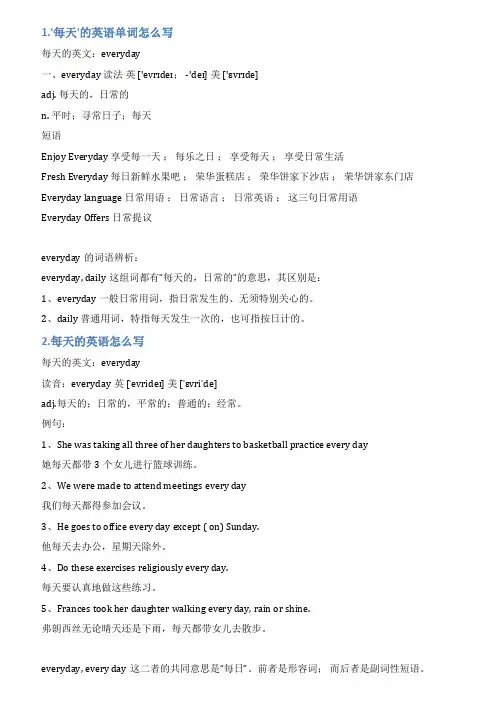
1.'每天'的英语单词怎么写每天的英文:everyday一、everyday 读法英 ['evrɪdeɪ; -'deɪ] 美 ['ɛvrɪde]adj. 每天的,日常的n. 平时;寻常日子;每天短语Enjoy Everyday 享受每一天;每乐之日;享受每天;享受日常生活Fresh Everyday 每日新鲜水果吧;荣华蛋糕店;荣华饼家下沙店;荣华饼家东门店Everyday language 日常用语;日常语言;日常英语;这三句日常用语Everyday Offers 日常提议everyday的词语辨析:everyday, daily这组词都有“每天的,日常的”的意思,其区别是:1、everyday 一般日常用词,指日常发生的、无须特别关心的。
2、daily 普通用词,特指每天发生一次的,也可指按日计的。
2.每天的英语怎么写每天的英文:everyday读音:everyday英 [ˈevrideɪ] 美 [ˈɛvriˈde]adj.每天的;日常的,平常的;普通的;经常。
例句:1、She was taking all three of her daughters to basketball practice every day她每天都带3个女儿进行篮球训练。
2、We were made to attend meetings every day我们每天都得参加会议。
3、He goes to office every day except ( on) Sunday.他每天去办公,星期天除外。
4、Do these exercises religiously every day.每天要认真地做这些练习。
5、Frances took her daughter walking every day, rain or shine.弗朗西丝无论晴天还是下雨,每天都带女儿去散步。
everyday, every day这二者的共同意思是“每日”。
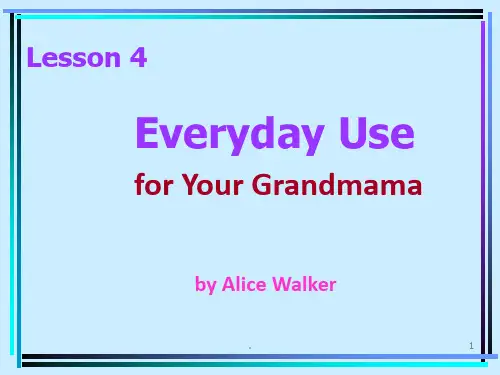
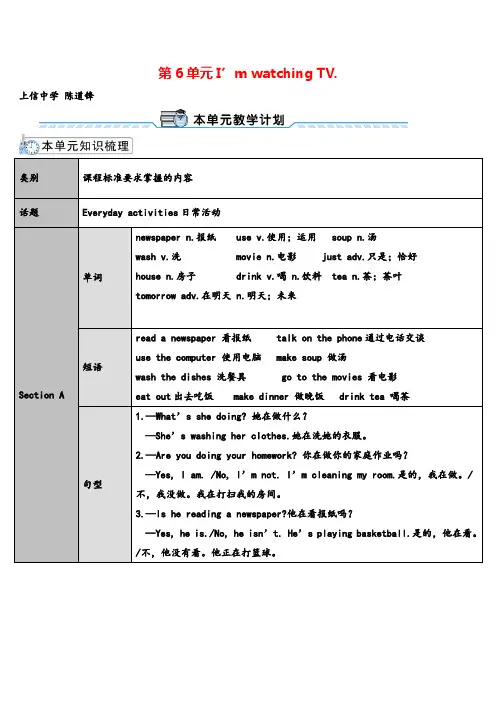
第6单元I’m watching TV. 上信中学陈道锋类别课程标准要求掌握的内容话题Everyday activities日常活动Section A 单词newspaper n.报纸 use v.使用;运用 soup n.汤wash v.洗 movie n.电影 just adv.只是;恰好house n.房子 drink v.喝 n.饮料 tea n.茶;茶叶tomorrow adv.在明天 n.明天;未来短语read a newspaper 看报纸 talk on the phone通过电话交谈use the computer 使用电脑 make soup 做汤wash the dishes 洗餐具 go to the movies 看电影eat out出去吃饭 make dinner 做晚饭 drink tea 喝茶句型1.—What’s she doing? 她在做什么?—She’s washing her clothes.她在洗她的衣服。
2.—Are you doing your homework? 你在做你的家庭作业吗?—Yes, I am. /No, I’m not. I’m cleaning my room.是的,我在做。
/不,我没做。
我在打扫我的房间。
3.—Is he reading a newspaper?他在看报纸吗?—Yes, he is./No, he isn’t. He’s playing basketball.是的,他在看。
/不,他没有看。
他正在打篮球。
Section B单词pool n.游泳池;水池 shop v.购物 n.商店supermarket n.超市man n.男人;人 race n.竞赛study v. & n.学习;研究state n.州 the United States 美国;美利坚合众国any adj.任何的;任一的pron.任何;任一 child n.儿童(pl.children)other adj.另外的;其他的pron.另外的人(或物) wish v.希望oung adj.幼小的;年轻的 miss v.怀念;思念;错过delicious adj.可口的;美味的 still adv. 还;仍然American adj.美国的;美洲的 n.美国人;美洲人host n.主人;东道主 dragon n.龙短语live with sb.和某人一起住 Dragon Boat Festival 端午节make zongzi 包粽子 watch… on TV 在电视上看……the night befoe 前一天夜里 host family寄宿家庭read a story to sb.读故事给某人听 living room 客厅talk show脱口秀 study for为……考试而学习句型1.…, so it’s like any other night for Zhu Hui and his host family.……,所以对朱辉和他的寄家庭来说,今晚和任何一个平常的晚上是一样的。
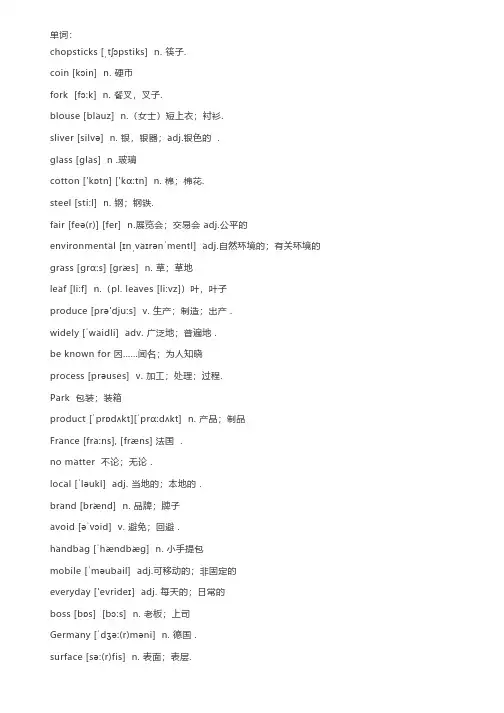
单词:chopsticks [ˌtʃɔpstiks] n. 筷子.coin [kɔin] n. 硬币fork [fɔ:k] n. 餐叉,叉子.blouse [blauz] n.(女士)短上衣;衬衫.sliver [silvə] n. 银,银器;adj.银色的 .glass [glas] n .玻璃cotton ['kɒtn] ['kɑ:tn] n. 棉;棉花.steel [sti:l] n. 钢;钢铁.fair [feə(r)] [fer] n.展览会;交易会 adj.公平的environmental [ɪnˌvaɪrənˈmentl] adj.自然环境的;有关环境的 grass [ɡrɑ:s] [ɡræs] n. 草;草地leaf [li:f] n.(pl. leaves [li:vz])叶,叶子produce [prə'dju:s] v. 生产;制造;出产 .widely [ˈwaidli] adv. 广泛地;普遍地 .be known for 因……闻名;为人知晓process [prəuses] v. 加工;处理;过程.Park 包装;装箱product [ˈprɒdʌkt][ˈprɑ:dʌkt] n. 产品;制品France [fra:ns], [fræns] 法国 .no matter 不论;无论 .local [ˈləukl] adj. 当地的;本地的 .brand [brænd] n. 品牌;牌子avoid [əˈvɔid] v. 避免;回避 .handbag [ˈhændbæg] n. 小手提包mobile [ˈməubail] adj.可移动的;非固定的everyday ['evrideɪ] adj. 每天的;日常的boss [bɒs] [bɔ:s] n. 老板;上司Germany [ˈdʒə:(r)məni] n. 德国 .surface [sə:(r)fis] n. 表面;表层.material [məˈtiəriəl] n. 材料;原料 .traffic [ˈtræfɪk] n. 交通;路上行驶的车辆postman [ˈpəustmən] n. 邮递员 . cap [kæp] n(尤指有帽舌的)帽子 glove [glʌv] n(分手指的)手套 .international [ˌintə(r) ˈnæʃnəl] adj. 国际的competitor [kəmˈpetitə(r)] n. 参赛者;竞争者its [its] adj. 它的form [fɔ:(r)m] n. 形式;类型clay [klei] n. 黏土;陶土celebration [ˌselɪˈbreɪʃn] n. 庆典;庆祝活动balloon [bəˈlu:n] n. 气球 .paper cutting 剪纸scissors [ˈsizə(r)z] n. (pl.) 剪刀lively [ˈlaivli] adj. 生气勃勃的;(色彩)鲜艳的fairy [ˈfeəri] [ˈferi] tale [teil] n 童话故事historical [hɪˈstɒrɪkl] adj.(有关)历史的heat [hi:t] n. 热;高温 v. 加热,变热polish [ˈpɒlɪʃ][ˈpɑ:lɪʃ] v. 磨光;修改;润色complete [kəmˈpli:t] v. 完成Korea [kəˈri:ə] 朝鲜;韩国Switzerland [switsə(r)lənd] 瑞士San Francisco [ˌsæn frənˈsiskəu] 圣弗朗西斯科(旧金山,美国城市) Marcus [ˈmɑ:kəs] n. 马库斯(男子名)Pam [pæm] 帕姆(女名)U n i t5知识梳理02Unit 5 What are the shirts made of?【重点短语】1.be made of 由...制成的(表示制成成品后,仍可看出原材料是什么)2.be made from 由...制成的(在成品中已无法辨认原材料)3.be known for 以......闻名4.be used for 被用于......5.no matter 不论;无论6.be covered with 用...覆盖7.as far as I know 据我所知8.by hand 用手9.be good for 对……有益10.on the last friday of each month最后一个星期五11.be good at 擅长12.make high-technology products 制造高科技产品13.the earth’s surface 地球表面14.many different kinds of 许多不同种类的15.fly a kite 放风筝16.such as 例如17.according to 根据 按照18.ask for help 请求帮助19.a symbol of ……的象征20.put…on… 把……放在……上21.be used for 被用于做……22.good luck 好运23.at a very high heat 在高温下24.be made in 在……制造的25.be famous for 以……著名26.on the sides of mountains 在山腰上27.traffic accident 交通事故28.a kite festival 风筝节29.be from 来自30.turn ……into ……把……变成……【重点句型】1. What are the shirts made of?衬衫是由什么制成的?2. It was made in Thailand.它是在泰国制造的。
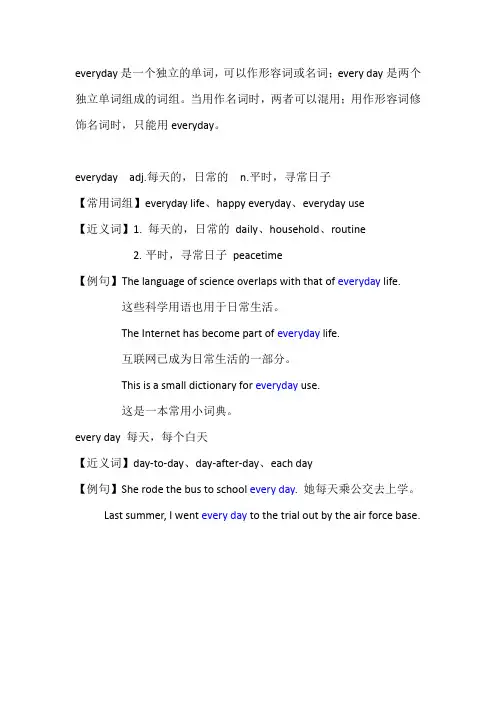
everyday是一个独立的单词,可以作形容词或名词;every day是两个独立单词组成的词组。
当用作名词时,两者可以混用;用作形容词修饰名词时,只能用everyday。
everyday adj.每天的,日常的n.平时,寻常日子
【常用词组】everyday life、happy everyday、everyday use
【近义词】1. 每天的,日常的daily、household、routine
2.平时,寻常日子peacetime
【例句】The language of science overlaps with that of everyday life.
这些科学用语也用于日常生活。
The Internet has become part of everyday life.
互联网已成为日常生活的一部分。
This is a small dictionary for everyday use.
这是一本常用小词典。
every day 每天,每个白天
【近义词】day-to-day、day-after-day、each day
【例句】She rode the bus to school every day. 她每天乘公交去上学。
Last summer, I went every day to the trial out by the air force base.。
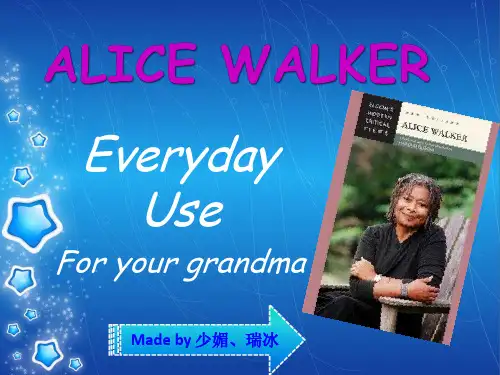
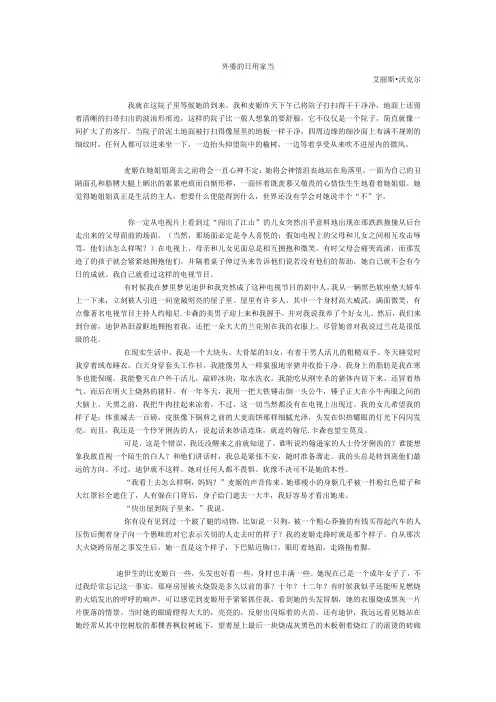
外婆的日用家当艾丽斯•沃克尔我就在这院子里等候她的到来。
我和麦姬昨天下午已将院子打扫得干干净净,地面上还留着清晰的扫帚扫出的波浪形痕迹,这样的院子比一般人想象的要舒服,它不仅仅是一个院子,简直就像一间扩大了的客厅。
当院子的泥土地面被打扫得像屋里的地板一样干净,四周边缘的细沙面上布满不规则的细纹时,任何人都可以进来坐一下,一边抬头仰望院中的榆树,一边等着享受从来吹不进屋内的微风。
麦姬在她姐姐离去之前将会一直心神不定:她将会神情沮丧地站在角落里,一面为自己的丑陋面孔和胳膊大腿上晒出的累累疤痕而自惭形秽,一面怀着既羡慕又敬畏的心情怯生生地看着她姐姐。
她觉得她姐姐真正是生活的主人,想要什么便能得到什么,世界还没有学会对她说半个“不”字。
你一定从电视片上看到过“闯出了江山”的儿女突然出乎意料地出现在那跌跌撞撞从后台走出来的父母面前的场面。
(当然,那场面必定是令人喜悦的:假如电视上的父母和儿女之间相互攻击辱骂,他们该怎么样呢?)在电视上,母亲和儿女见面总是相互拥抱和微笑。
有时父母会痛哭流涕,而那发迹了的孩子就会紧紧地拥抱他们,并隔着桌子伸过头来告诉他们说若没有他们的帮助,她自己就不会有今日的成就。
我自己就看过这样的电视节目。
有时候我在梦里梦见迪伊和我突然成了这种电视节目的剧中人。
我从一辆黑色软座垫大轿车上一下来,立刻被人引进一间宽敞明亮的屋子里。
屋里有许多人,其中一个身材高大威武,满面微笑,有点像著名电视节目主持人约翰尼.卡森的美男子迎上来和我握手,并对我说我养了个好女儿。
然后,我们来到台前,迪伊热泪盈眶地拥抱着我,还把一朵大大的兰花别在我的衣服上,尽管她曾对我说过兰花是很低级的花。
在现实生活中,我是一个大块头、大骨架的妇女,有着干男人活儿的粗糙双手。
冬天睡觉时我穿着绒布睡衣,白天身穿套头工作衫。
我能像男人一样狠狠地宰猪并收拾干净。
我身上的脂肪是我在寒冬也能保暖。
我能整天在户外干活儿,敲碎冰块,取水洗衣。
我能吃从刚宰杀的猪体内切下来、还冒着热气、而后在明火上烧熟的猪肝。
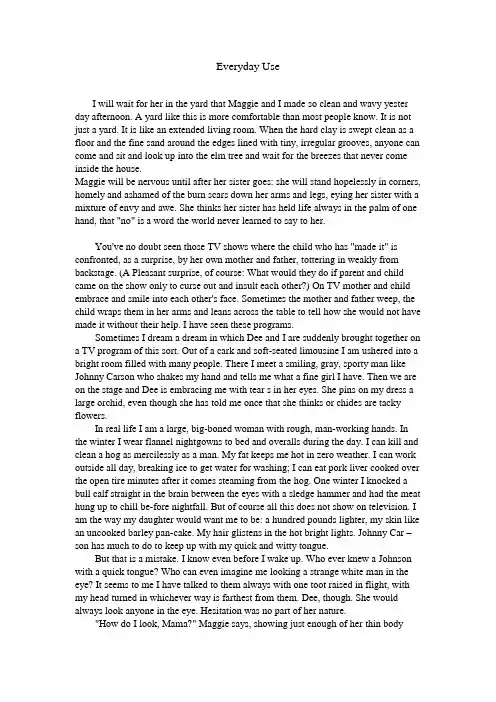
Everyday UseI will wait for her in the yard that Maggie and I made so clean and wavy yester day afternoon. A yard like this is more comfortable than most people know. It is not just a yard. It is like an extended living room. When the hard clay is swept clean as a floor and the fine sand around the edges lined with tiny, irregular grooves, anyone can come and sit and look up into the elm tree and wait for the breezes that never come inside the house.Maggie will be nervous until after her sister goes: she will stand hopelessly in corners, homely and ashamed of the burn scars down her arms and legs, eying her sister with a mixture of envy and awe. She thinks her sister has held life always in the palm of one hand, that "no" is a word the world never learned to say to her.You've no doubt seen those TV shows where the child who has "made it" is confronted, as a surprise, by her own mother and father, tottering in weakly from backstage. (A Pleasant surprise, of course: What would they do if parent and child came on the show only to curse out and insult each other?) On TV mother and child embrace and smile into each other's face. Sometimes the mother and father weep, the child wraps them in her arms and leans across the table to tell how she would not have made it without their help. I have seen these programs.Sometimes I dream a dream in which Dee and I are suddenly brought together on a TV program of this sort. Out of a cark and soft-seated limousine I am ushered into a bright room filled with many people. There I meet a smiling, gray, sporty man like Johnny Carson who shakes my hand and tells me what a fine girl I have. Then we are on the stage and Dee is embracing me with tear s in her eyes. She pins on my dress a large orchid, even though she has told me once that she thinks or chides are tacky flowers.In real life I am a large, big-boned woman with rough, man-working hands. In the winter I wear flannel nightgowns to bed and overalls during the day. I can kill and clean a hog as mercilessly as a man. My fat keeps me hot in zero weather. I can work outside all day, breaking ice to get water for washing; I can eat pork liver cooked over the open tire minutes after it comes steaming from the hog. One winter I knocked a bull calf straight in the brain between the eyes with a sledge hammer and had the meat hung up to chill be-fore nightfall. But of course all this does not show on television. I am the way my daughter would want me to be: a hundred pounds lighter, my skin like an uncooked barley pan-cake. My hair glistens in the hot bright lights. Johnny Car –son has much to do to keep up with my quick and witty tongue.But that is a mistake. I know even before I wake up. Who ever knew a Johnson with a quick tongue? Who can even imagine me looking a strange white man in the eye? It seems to me I have talked to them always with one toot raised in flight, with my head turned in whichever way is farthest from them. Dee, though. She would always look anyone in the eye. Hesitation was no part of her nature."How do I look, Mama?" Maggie says, showing just enough of her thin bodyenveloped in pink skirt and red blouse for me to know she's there, almost hidden by the door."Come out into the yard," I say.Have you ever seen a lame animal, perhaps a dog run over by some careless person rich enough to own a car, sidle up to someone who is ignorant enough to be kind of him? That is the way my Maggie walks. She has been like this, chin on chest, eyes on ground, feet in shuffle, ever since the fire that burned the other house to the ground.Dee is lighter than Maggie, with nicer hair and a fuller figure. She's a woman now, though sometimes I forget. How long ago was it that the other house burned? Ten, twelve years? Sometimes I can still hear the flames and feel Maggie's arms sticking to me, her hair smoking and her dress falling off her in little black papery flakes. Her eyes seemed stretched open, blazed open by the flames reflect-ed in them. And Dee. I see her standing off under the sweet gum tree she used to dig gum out of;a look at concentration on her face as she watched the last dingy gray board of the house tall in toward the red-hot brick chimney. Why don't you do a dance around the ashes? I'd wanted to ask her. She had hated the house that much.I used to think she hated Maggie, too. But that was before we raised the money, the church and me, to send her to Augusta to school. She used to read to us without pity, forcing words, lies, other folks' habits, whole lives upon us two, sitting trapped and ignorant underneath her voice. She washed us in a river of make-believe, burned us with a lot of knowledge we didn't necessarily need to know. Pressed us to her with the serious way she read, to shove us away at just the moment, like dimwits, we seemed about to understand.Dee wanted nice things. A yellow organdy dress to wear to her graduation from high school; black pumps to match a green suit she'd made from an old suit somebody gave me. She was determined to stare down any disaster in her efforts. Her eyelids would not flicker for minutes at a time. Often I fought off the temptation to shake her. At sixteen she had a style of her own' and knew what style was.回答人的补充 2009-09-30 18:43I never had an education myself. After second grade the school was closed down. Don't ask me why. in 1927 colored asked fewer questions than they do now. Sometimes Maggie reads to me. She stumbles along good-naturedly but can't see well. She knows she is not bright. Like good looks and money, quickness passed her by. She will marry John Thomas (who has mossy teeth in an earnest face) and then I'll be free to sit here and I guess just sing church songs to myself. Although I never was a good singer. Never could carry a tune. I was always better at a man's job. 1 used to love to milk till I was hooked in the side in '49. Cows are soothing and slow and don't bother you, unless you try to milk them the wrong way.I have deliberately turned my back on the house. It is three rooms, just like the one that burned, except the roof is tin: they don't make shingle roofs any more. There are no real windows, just some holes cut in the sides, like the portholes in a ship, but not round and not square, with rawhide holding the shutter s up on the outside. Thishouse is in a pasture, too, like the other one. No doubt when Dee sees it she will want to tear it down. She wrote me once that no matter where we "choose" to live, she will manage to come see us. But she will never bring her friends. Maggie and I thought about this and Maggie asked me, Mama, when did Dee ever have any friends?"She had a few. Furtive boys in pink shirts hanging about on washday after school. Nervous girls who never laughed. Impressed with her they worshiped the well-turned phrase, the cute shape, the scalding humor that erupted like bubbles in lye. She read to them.When she was courting Jimmy T she didn't have much time to pay to us, but turned all her faultfinding power on him. He flew to marry a cheap city girl from a family of ignorant flashy people. She hardly had time to recompose herself.When she comes I will meet -- but there they are!Maggie attempts to make a dash for the house, in her shuffling way, but I stay her with my hand. "Come back here," I say. And she stops and tries to dig a well in the sand with her toe.It is hard to see them clearly through the strong sun. But even the first glimpse of leg out of the car tells me it is Dee. Her feet were always neat-looking, as it God himself had shaped them with a certain style. From the other side of the car comes a short, stocky man. Hair is all over his head a foot long and hanging from his chin like a kinky mule tail. I hear Maggie suck in her breath. "Uhnnnh," is what it sounds like. Like when you see the wriggling end of a snake just in front of your toot on the road. "Uhnnnh."Dee next. A dress down to the ground, in this hot weather. A dress so loud it hurts my eyes. There are yel-lows and oranges enough to throw back the light of the sun. I feel my whole face warming from the heat waves it throws out. Earrings gold, too, and hanging down to her shoulders. Bracelets dangling and making noises when she moves her arm up to shake the folds of the dress out of her armpits. The dress is loose and flows, and as she walks closer, I like it. I hear Maggie go "Uhnnnh" again. It is her sister's hair. It stands straight up like the wool on a sheep. It is black as night and around the edges are two long pigtails that rope about like small lizards disappearing behind her ears."Wa-su-zo-Tean-o!" she says, coming on in that gliding way the dress makes her move. The short stocky fellow with the hair to his navel is all grinning and he follows up with "Asalamalakim, my mother and sister!" He moves to hug Maggie but she falls back, right up against the back of my chair. I feel her trembling there and when I look up I see the perspiration falling off her chin."Don't get up," says Dee. Since I am stout it takes something of a push. You can see me trying to move a second or two before I make it. She turns, showing white heels through her sandals, and goes back to the car. Out she peeks next with a Polaroid. She stoops down quickly and lines up picture after picture of me sitting there in front of the house with Maggie cowering behind me. She never takes a shot without making sure the house is included. When a cow comes nibbling around the edge of the yard she snaps it and me and Maggie and the house. Then she puts thePolaroid in the back seat of the car, and comes up and kisses me on the forehead.Meanwhile Asalamalakim is going through motions with Maggie's hand. Maggie's hand is as limp as a fish, and probably as cold, despite the sweat, and she keeps trying to pull it back. It looks like Asalamalakim wants to shake hands but wants to do it fancy. Or maybe he don't know how people shake hands. Anyhow, he soon gives up on Maggie."Well," I say. "Dee.""No, Mama," she says. "Not 'Dee', Wangero Leewanika Kemanjo!""What happened to 'Dee'?" I wanted to know."She's dead," Wangero said. "I couldn't bear it any longer, being named after the people who oppress me.""You know as well as me you was named after your aunt Dicle," I said. Dicie is my sister. She named Dee. We called her "Big Dee" after Dee was born."But who was she named after?" asked Wangero."I guess after Grandma Dee," I said."And who was she named after?" asked Wangero."Her mother," I said, and saw Wangero was getting tired. "That's about as far back as I can trace it," I said.Though, in fact, I probably could have carried it back beyond the Civil War through the branches."Well," said Asalamalakim, "there you are.""Uhnnnh," I heard Maggie say."There I was not," I said, before 'Dicie' cropped up in our family, so why should I try to trace it that far back?"He just stood there grinning, looking down on me like somebody inspecting a Model A car. Every once in a while he and Wangero sent eye signals over my head."How do you pronounce this name?" I asked."You don't have to call me by it if you don't want to," said Wangero."Why shouldn't I?" I asked. "If that's what you want us to call you, we'll call you. ""I know it might sound awkward at first," said Wangero."I'll get used to it," I said. "Ream it out again."Well, soon we got the name out of the way. Asalamalakim had a name twice as long and three times as hard. After I tripped over it two or three times he told me to just call him Hakim-a-barber. I wanted to ask him was he a barber, but I didn't really think he was, so I don't ask."You must belong to those beet-cattle peoples down the road," I said. They said "Asalamalakirn" when they met you too, but they didn't Shake hands. Always too busy feeding the cattle, fixing the fences, putting up salt-lick shelters, throwing down hay. When the white folks poisoned some of the herd the men stayed up all night with rifles in their hands. I walked a mile and a half just to see the sight.Hakim-a-barber said, "I accept some of their doctrines, but farming and raising cattle is not my style." (They didn't tell me, and I didn't ask, whether Wangero (Dee) had really gone and married him.)We sat down to eat and right away he said he didn't eat collards and pork was unclean. Wangero, though, went on through the chitlins and corn bread, the greens and every-thing else. She talked a blue streak over the sweet potatoes. Everything delighted her. Even the fact that we still used the benches her daddy made for the table when we couldn't afford to buy chairs."Oh, Mama!" she cried. Then turned to Hakim-a-barber. "I never knew how lovely these benches are. You can feel the rump prints," she said, running her hands underneath her and along the bench. Then she gave a sigh and her hand closed over Grandma Dee's butter dish. "That's it!" she said. "I knew there was something I wanted to ask you if I could have." She jumped up from the table and went over in the corner where the churn stood, the milk in it clabber by now. She looked at the churn and looked at it."This churn top is what I need," she said. "Didn't Uncle Buddy whittle it out of a tree you all used to have?""Yes," I said."Uh huh, " she said happily. "And I want the dasher,too.""Uncle Buddy whittle that, too?" asked the barber.Dee (Wangero) looked up at me."Aunt Dee's first husband whittled the dash," said Maggie so low you almost couldn't hear her. "His name was Henry, but they called him Stash.""Maggie's brain is like an elephants," Wanglero said, laughing. "I can use the churn top as a center piece for the alcove table,”she said, sliding a plate over the churn, "and I'll think of something artistic to do with the dasher."回答人的补充 2009-09-30 18:56When she finished wrapping the dasher the handle stuck out. I took it for a moment in my hands. You didn't even have to look close to see where hands pushing the dasher up and down to make butter had left a kind of sink in the wood. In fact, there were a lot of small sinks; you could see where thumbs and fingers had sunk into the wood. It was beautiful light yellow wood, from a tree that grew in the yard where Big Dee and Stash had lived.After dinner Dee (Wangero) went to the trunk at the foot of my bed and started rifling through it. Maggie hung back in the kitchen over the dishpan. Out came Wangero with two quilts. They had been pieced by Grandma Dee and then Big Dee and me had hung them on the quilt frames on the front porch and quilted them. One was in the Lone Star pattern. The other was Walk Around the Mountain. In both of them were scraps of dresses Grandma Dee had worn fifty and more years ago. Bit sand pieces of Grandpa Jarrell's Paisley shirts. And one teeny faded blue piece, about the size of a penny matchbox, that was from Great Grandpa Ezra's uniform that he wore in the Civil War."Mama," Wangero said sweet as a bird. "Can I have these old quilts?"I heard something fall in the kitchen, and a minute later the kitchen door slammed."Why don't you take one or two of the others?” 1 asked. "These old things wasjust done by me and Big Dee from some tops your grandma pieced before she died.""No," said Wangero. "I don't want those. They are stitched around the borders by machine.""That'll make them last better," I said."That's not the point," said Wanglero. "These are all pieces of dresses Grandma used to wear. She did all this stitching by hand. Imagine!" She held the quilts securely in her arms, stroking them."Some of the pieces, like those lavender ones, come from old clothes her mother handed down to her,” I said, movi ng up to touch the quilts. Dee (Wangero) moved back just enough so that I couldn't reach the quilts. They already belonged to her. "Imagine!" she breathed again, clutching them closely to her bosom."The truth is," I said, "I promised to give them quilts to Maggie, for when she marries John Thomas."She gasped like a bee had stung her."Maggie can't appreciate these quilts!" she said. "She'd probably be backward enough to put them to everyday use.""I reckon she would," I said. "God knows I been sav age ’em for long enough with nobody using 'em. I hope she will! ” I didn't want to bring up how I had offered Dee (Wangero) a quilt when she went away to college. Then she had told me they were old-fashioned, out of style."But they're priceless!" she was saying now, furiously, for she has a temper. "Maggie would put them on the bed and in five years they'd be in rags. Less than that!" "She can always make some more,” I said. "Maggie knows how to quilt. "Dee (Wangero) looked at me with hatred. "You just will not understand. The point is these quilts, these quilts!""Well," I said,, stumped. "What would you do with them?""Hang them," she said. As it that was the only thing you could do with quilts.Maggie by now was standing in the door. I could almost hear the sound her feet made as they scraped over each other."She can have them, Mama,” she said like somebody used to never winning anything, or having anything reserved for her. "I can 'member Grandma Dee without the quilts."I looked at her hard. She had filled her bottom lip with checkerberry snuff and it gave her face a kind of dopey, hangdog look. It was Grandma Dee and Big Dee who taught her how to quilt herself. She stood there with her scarred hands hidden in the folds of her skirt. She looked at her sister with something like fear but she wasn't mad at her. This was Maggie's portion. This was the way she knew God to work.When I looked at her like that something hit me in the top of my head and ran down to the soles of my feet. Just like when I'm in church and the spirit of God touches me and I get happy and shout. I did something I never had done before: hugged Maggie to me, then dragged her on into the room, snatched the quilts out of Miss Wangero's hands and dumped them into Maggie's lap. Maggie just sat there on my bed with her mouth open."Take one or two of the others," I said to Dee.But she turned without a word and went out to Hakim-a-barber."You just don't understand," she said, as Maggie and I came out to the car."What don't I under stand?" I wanted to know."Your heritage," she said. And then she turned to Maggie, kissed her, and said, "You ought to try to make some-thing of yourself, too, Maggie. It's really a new day for us. But from the way you and Mama still live you'd never know it."She put on some sunglasses that hid everything above the tip of her nose and her chin.Maggie smiled; maybe at the sunglasses. But a real mile, not scared. After we watched the car dust settle I asked Maggie to bring me a dip of snuff. And then the two of us sat there just enjoying, until it was time to go in the house and go to bed. NOTES1) Alice Walker: born 1944 in Eatonton, Georgia, America and graduated from Sarah Lawrence College. Her books include The Third Life of Grange Copeland ( 1970 ), Meridian ( 1976 ), The Color Purple(1982), etc.2)"made it": to become a success, to succeed, either in specific endeavor or in general3) Johnny Carson: a man who runs a late night talk show4)hooked: injured by the horn of the cow being milked5) Jimmy T: 'T' is the initial of the surname of the boy Dee was courting.6)"Wa-su-zo-Tean-o!": phonetic rendering of an African dialect salutation7) "Asalamalakim": phonetic rendering of a Muslim greeting8) Polaroid: a camera that produces instant pictures9) the Civil War: the war between the North and the South in the U. S.(1861-1865)10) branches: branches or divisions of a family descending from a common ancestor11) Ream it out again: "Ream" is perhaps an African dialect word meaning: "unfold, display". Hence the phrase may mean "repeat" or "say it once again"12) pork was unclean: Muslims are forbidden by their religion to eat pork because it is considered to be unclean.13) Chitlins: also chitlings or chitterlings, the small intestines of pigs, used for food, a common dish in Afro-American households14) rump prints: depressions in the benches made by constant sitting15) sink: depressions in the wood of the handle left by the thumbs and fingers外婆的日用家当艾丽斯•沃克尔我就在这院子里等候她的到来。
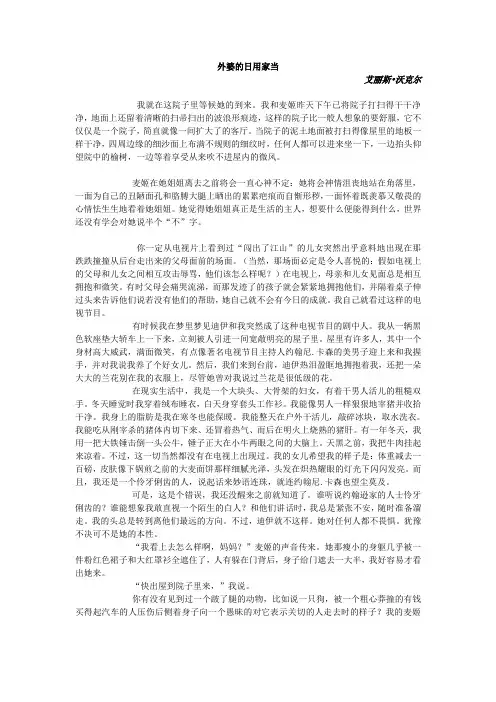
外婆的日用家当艾丽斯•沃克尔我就在这院子里等候她的到来。
我和麦姬昨天下午已将院子打扫得干干净净,地面上还留着清晰的扫帚扫出的波浪形痕迹,这样的院子比一般人想象的要舒服,它不仅仅是一个院子,简直就像一间扩大了的客厅。
当院子的泥土地面被打扫得像屋里的地板一样干净,四周边缘的细沙面上布满不规则的细纹时,任何人都可以进来坐一下,一边抬头仰望院中的榆树,一边等着享受从来吹不进屋内的微风。
麦姬在她姐姐离去之前将会一直心神不定:她将会神情沮丧地站在角落里,一面为自己的丑陋面孔和胳膊大腿上晒出的累累疤痕而自惭形秽,一面怀着既羡慕又敬畏的心情怯生生地看着她姐姐。
她觉得她姐姐真正是生活的主人,想要什么便能得到什么,世界还没有学会对她说半个“不”字。
你一定从电视片上看到过“闯出了江山”的儿女突然出乎意料地出现在那跌跌撞撞从后台走出来的父母面前的场面。
(当然,那场面必定是令人喜悦的:假如电视上的父母和儿女之间相互攻击辱骂,他们该怎么样呢?)在电视上,母亲和儿女见面总是相互拥抱和微笑。
有时父母会痛哭流涕,而那发迹了的孩子就会紧紧地拥抱他们,并隔着桌子伸过头来告诉他们说若没有他们的帮助,她自己就不会有今日的成就。
我自己就看过这样的电视节目。
有时候我在梦里梦见迪伊和我突然成了这种电视节目的剧中人。
我从一辆黑色软座垫大轿车上一下来,立刻被人引进一间宽敞明亮的屋子里。
屋里有许多人,其中一个身材高大威武,满面微笑,有点像著名电视节目主持人约翰尼.卡森的美男子迎上来和我握手,并对我说我养了个好女儿。
然后,我们来到台前,迪伊热泪盈眶地拥抱着我,还把一朵大大的兰花别在我的衣服上,尽管她曾对我说过兰花是很低级的花。
在现实生活中,我是一个大块头、大骨架的妇女,有着干男人活儿的粗糙双手。
冬天睡觉时我穿着绒布睡衣,白天身穿套头工作衫。
我能像男人一样狠狠地宰猪并收拾干净。
我身上的脂肪是我在寒冬也能保暖。
我能整天在户外干活儿,敲碎冰块,取水洗衣。
我能吃从刚宰杀的猪体内切下来、还冒着热气、而后在明火上烧熟的猪肝。
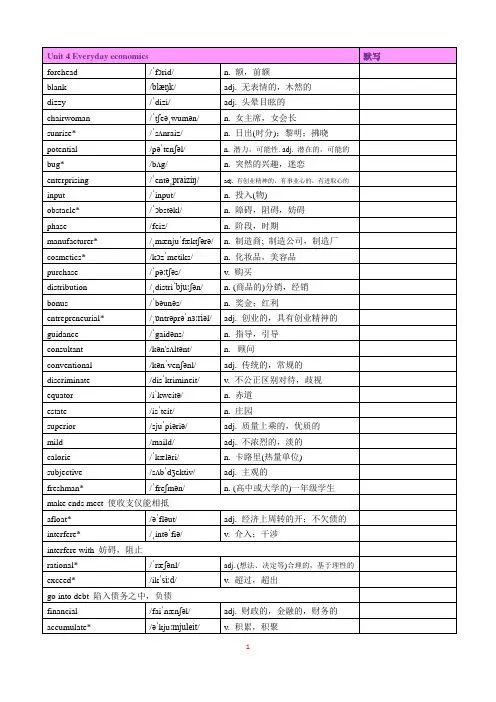
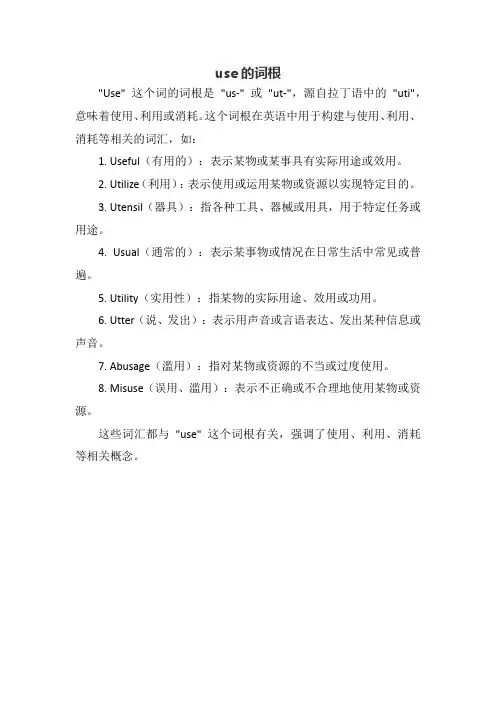
use的词根
"Use" 这个词的词根是"us-" 或"ut-",源自拉丁语中的"uti",意味着使用、利用或消耗。
这个词根在英语中用于构建与使用、利用、消耗等相关的词汇,如:
1. Useful(有用的):表示某物或某事具有实际用途或效用。
2. Utilize(利用):表示使用或运用某物或资源以实现特定目的。
3. Utensil(器具):指各种工具、器械或用具,用于特定任务或用途。
4. Usual(通常的):表示某事物或情况在日常生活中常见或普遍。
5. Utility(实用性):指某物的实际用途、效用或功用。
6. Utter(说、发出):表示用声音或言语表达、发出某种信息或声音。
7. Abusage(滥用):指对某物或资源的不当或过度使用。
8. Misuse(误用、滥用):表示不正确或不合理地使用某物或资源。
这些词汇都与"use" 这个词根有关,强调了使用、利用、消耗等相关概念。
Unit 4 Everyday use for your grandmammaWhat is a plot?If an author writes, "The king died and then the queen died," there is no plot for a story. But by writing, "The king d and then the queen died of grief," the writer has provided a plot line for a story.A plot is a causal sequence of events, the "why" for the things that happen in the story. The plot draws the reader the character's lives and helps the reader understand the choices that the characters make.The Structure of a plot1.Exposition - introduction of themain characters and setting2.Rising Action - one (or more)characters in crisis3.Climax - point of highest emotion;turning point4.Falling Action - resolution ofcharacter’s crisis5.Denouement (outcome) - “untyingof plot treads”; resolutionNarration NarratorFirst-person narration; third-person narrationNarrator ≠ authorThe titleThe meaning of the title requires the reader to read deeper within the short story. The phraseabout the question whether or not heritage should be preserved and displayed or integrated into everyday life. “Everyday Use” pertains not only to the quilt, but more so to people's culture and heritage and how they choo it.The themeThe main theme in the story concerns the characters’ connections to their ancestral roots.Dee Johnson b elieves t hat she is affirming her African h eritage b y changing h er name, her mannerisms, and her appearance, even though her family has lived in the United States for several generations.The themedated by her new image as “Wangero”. Their own connection Maggie and Mrs. Johnson are confused and intimiheritage rest on their memories of their mothers and grandmothers; they prefer to remember them for who they w individuals, not as members of a particular race.Because of their differing viewpoints, they place different values on some old quilts and other objects in the home The backgroundBy the 1960s, f ollowing the success o f civil rights l eaders like M artin L uther King, Jr. and Malcolm X, some A frican Americans began to take pride in their heritage as a way of gaining their esteem, forging a group identity, and cre platform for greater political power.Known as “black pride” or Black Nationalism, these ideas encouraged many young African Americans to le their cul tural ancestry, grow their hair into “Afros”, dress in traditional African clothing, and reject Cultural nationalismCultural n ationalism was founded o n the belief that blacks a nd whites h ave separate v alues, h istories, intellectual traditions and lifestyles and therefore that in reality, there are two separate Americas.Cultural nationalism was often expressed a as a conceptual and aesthetic return to the motherland (rarely an actu return), a recognition of the African r oots that blacks i n America h ad begun to forget as a result o f slavery, b iased education and stereotyped representations in the mass media.nationalism,Ron Karenga, one of the strongest voices in favor of culturalIn his article, "Black Cultural Nationalism,"writes,"Let our art remind us of our distaste for the enemy, our love for each other, and our commitment to the revolutionary struggle that will be fought with the rhythmic reality of a permanent revolution"Cultural nationalism on a visual level was expressed in the same way, by the wearing of brightly colored African c such as dashikis, and the adaptation of the Afro hair style, both symbolic representations of the important relation between Blacks in America and their African roots.Mama (Ms Johnson)The narrator of the story.She is a middle-aged or older African-American woman living with her younger daughter, Maggie.Although poor, she is strong and independent, and takes great pride in her way of life.She is over weight, and built more like a man than a woman. She has strong hands that are worn from a lifetime o work.MaggieDee’s sister who was badly burned by a fire when she was young.She has low self-confidence and becomes uncomfortable when Dee is around.Maggie contrasts Dee by showing a special regard for her immediate family.DeeMrs. Johnson’s older daughter.She is attractive, sophisticated, and well-educated.She is also very selfish, bold, and overly confident.Wangero because she wants to be a bigger part of her culture. When she returns home, she insists her family calls herThe only reason she wants this is because it’s suddenly the new trend.the historical presentThe historical present (sometimes dramatic present) refers to the employment of the present tense when narrating events. i t is used in fiction, for “hot news” (as in headlines), and in everyday c onversation. In conversation, it isgo).tell, write, and s ay (and in colloquial uses,particularly common with “verbs of communication” such asThe historical present has the effect of making past events more vivid.P1: the yard that Maggie and I made so clean and wavywavy: having regular curvesA wavy line has a series of regular curves along it.Here in the text the word describes the marks in wavy patterns on the clay ground left by the broom.P1: It is like an extended living room.Extended: enlargedP1: When the hard clay is swept cleanA fine-grained, firm earthy material that is plastic when wet and hardens when heated, consisting primarily of hydr silicates of aluminum and widely used in making bricks, tiles, and pottery.粘土,泥土P1: the fine sand around the edges lined with tiny, irregular groovesFine: thin, in small particlesGroove nouna long narrow cut in the surface of sth hard:沟、槽Cut a groove 3 cm from the top of the piece of wood.P1: sit and look up into the elm tree榆树P2: homely and ashamed of the burn scarsugly. Say she is plain o r homely.)Not handsome or beautiful: plain, unattractive. (Never say a woman or a girl ishomely furniture)Of a plain and unsophisticated nature: artless, unadorned, unpolished. (homely skills)Of or relating to the family or household: domestic, household. (P2: eying her sister with a mixture of envy and awesuggest the feelings of the person who looks.Look at and w atch d on’tTo eye means to look carefully, suspiciously, or thoughtfully, with fear, doubt, envy, desire, etc.P2: eying her sister with a mixture of envy and awenoun [U] feelings of respect and slight fear; feelings of being very impressed by sth/sb:awe and respectHe speaks of her with awe.be / stand in awe of sb/sth to admire sb/sth and be slightly frightened of them/it:While Diana was in awe of her grandfather, she adored her grandmotheramazement, wonderP2: She thinks her sister has held life always in the palm of one hand, that "no" is a word the world never learned to say to her..The world has satisfied her sister’s every desireHer sister has a firm control of life.P3: the child who has "made it" is confrontedTo have made i t: if you make it, you are successful in achieving sth. Difficult, or in s urviving through a very difficult period.I believe I have the talent to make it.You are brave and courageous. You can make it.P3: the child who has "made it" is confrontedthe economic problems confronting the1 (of problems or a difficult situation) to appear and need to be dealt with by sb:country3 to face sb so that they cannot avoid seeing and hearing you, especially in an unfriendly or dangerous situation:Thiswas the first time he had confronted an armed robber.P3: her own mother and father, tottering in weakly from backstage.1. [usually +a dv./ prep.] to walk or move with weak unsteady steps, especially because you are drunk or ill/sick; stag She managed to totter back to her seat.the tottering walls of the castle2 to be weak and seem likely to fall:out大声讲!没人能把你怎么样。
1.表示经常的英语怎么说“经常”常用的表达为:often; frequently; regularly; day-to-day。
双语例句:1、他经常上图书馆去。
He often goes to the library.2、这类问题是经常发生的。
This kind of problem frequently crops up.3、我掌握了大量关于这类事的最新信息,因为我经常收听新闻。
I am very up to date on this sort of thing because I listen to the news.4、我和妈妈过去经常争吵。
Mum and I used to fall out a lot.5、我经常喝点酒放松一下。
I regularly have a drink to wind down.2.每天的英语怎么写每天的英文:everyday读音:everyday英 [ˈevrideɪ] 美 [ˈɛvriˈde]adj.每天的;日常的,平常的;普通的;经常。
例句:1、She was taking all three of her daughters to basketball practice every day她每天都带3个女儿进行篮球训练。
2、We were made to attend meetings every day我们每天都得参加会议。
3、He goes to office every day except ( on) Sunday.他每天去办公,星期天除外。
4、Do these exercises religiously every day.每天要认真地做这些练习。
5、Frances took her daughter walking every day, rain or shine.弗朗西丝无论晴天还是下雨,每天都带女儿去散步。
everyday, every day这二者的共同意思是“每日”。
:like,characteristic of,or suggestive of waves波状的;有起伏的----------------------------------------------------------------------------------:a long,narrow furrow or hollow cut in a surface with a tool纹(道);纹槽---------------------------------------------------------------------------------- : designating a family(Ulmaceae)of trees growing largely in the N.Temperate Zone[植]榆科的---------------------------------------------------------------------------------- :be unsteady on one's feet;stagger蹒跚而行----------------------------------------------------------------------------------:any large luxurious sedan,esp. one driven by a chauffeur(配有司机的)高级轿车----------------------------------------------------------------------------------:characteristic of a sport or sporting man运动员似的----------------------------------------------------------------------------------: untidy;neglected;unrefined;vulgar劣等的;破旧的;粗俗的----------------------------------------------------------------------------------:a soft,lightweight,loosely woven woolen cloth with a slightly napped surface法兰绒---------------------------------------------------------------------------------- :a cereal grass(Hordeum vulgare and related species)with dense,bearded spikes of flowers,each made up of three single—seeded spikelets大麦----------------------------------------------------------------------------------:crippled;disabled;esp. having an injured leg or foot that makes one limp瘸的;残废的---------------------------------------------------------------------------------- :move sideways,esp. in a shy or stealthy manner(羞怯或偷偷地)侧身行走----------------------------------------------------------------------------------:a slow dragging walk拖着脚走----------------------------------------------------------------------------------:thin,light,etc.1ike paper(在厚薄、质地等方面)像纸的----------------------------------------------------------------------------------:dirty—colored;not bright or clean;grimy昏暗的,不明亮的;不干净的;无光泽的;弄脏了的----------------------------------------------------------------------------------:①n. pretense;feigning假装;虚假②adj. pretended;feigned;sham假装的;虚假的----------------------------------------------------------------------------------:[slang]a stupid person;simpleton[俚]蠢人,笨蛋,傻子----------------------------------------------------------------------------------: very sheer,crisp cotton fabric used for dresses,curtains,etc.蝉翼纱;玻璃纱(一种细薄的透明布)----------------------------------------------------------------------------------:.a low—cut shoe without straps or ties一种浅口无带皮鞋----------------------------------------------------------------------------------:move with a quick,light,wavering motion摇曳,摇动;晃动----------------------------------------------------------------------------------: full of or covered with moss or a mosslike growth生了苔的;多苔的;苔状的---------------------------------------------------------------------------------- :attack with the horns,as a bull;gore(牛等以角)抵破,抵伤----------------------------------------------------------------------------------:a thin,wedgeshaped piece of wood,slate, etc.1aid with others in a series of overlapping rows as a covering for roofs and the sides of the houses屋顶板;木瓦----------------------------------------------------------------------------------:an opening in a ship's side,as for admitting light and air(船侧采光、通气的)舷窗;舱口----------------------------------------------------------------------------------:done or acting in a stealthy manner,as if to hinder observation;surreptitious;stealthy;sneaky;secret鬼鬼祟祟的,偷偷摸摸的;秘密的---------------------------------------------------------------------------------- :[Am.colloq.]pretty or attractive,esp. in a delicate or dainty way[美口]漂亮的,俏的,迷人的;逗人喜爱的----------------------------------------------------------------------------------:fierce in attacking in words措辞尖锐的---------------------------------------------------------------------------------- :any strongly alkaline substance,usually sodium or potassium hydroxide,used in cleaning,making soap,etc.碱液----------------------------------------------------------------------------------: restore to composure使恢复镇静----------------------------------------------------------------------------------:heavily built;sturdy;short and thickset矮胖的;结实的----------------------------------------------------------------------------------:full of kinks;tightly curled,esp.of hair(尤指头发)绞缠的;纽结的;弯曲的----------------------------------------------------------------------------------:.twist from side to side,either in one place or when moving along 蠕动;扭动----------------------------------------------------------------------------------:[usu.p1.] an ornament worn on the ear[常用复数]耳环,耳饰----------------------------------------------------------------------------------:an ornamental band or chain worn about the wrist or arm手镯----------------------------------------------------------------------------------:the hollow place under the arm at the shoulder腋下,腋窝----------------------------------------------------------------------------------:any of several types of(usu.)small creatures which are reptiles。